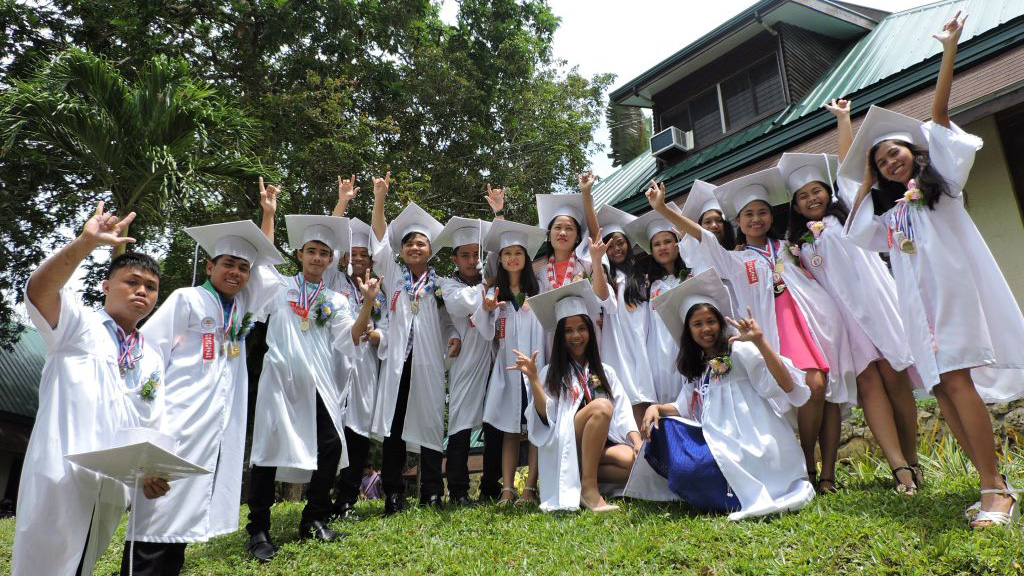
IDEA channeled all its donations to Bohol Foundation for the Deaf and Disabled, Inc. (BFDDI) until 1991 when IDEA Philippines was incorporated. BFDDI then began its partnership with the Philippine Department of Education (DepEd) to establish special education classes for deaf students. To supplement limited government funding, IDEA provides dorm and classroom buildings, furniture, books, teacher salaries and training. Through hard work, we have established a unique combination of academic and social skills training.
Academics:

 IDEA Philippines supports around 500 deaf students in six elementary and two high school residential programs. Through our cooperation with DepEd, dormitories and classrooms are located on public school campuses. IDEA-trained teachers provide instruction to deaf children in Kindergarten (Prep) through 4th year high school. All students are trained in English, math, science, history, Filipino, health, values, art, P.E., and home economics. Additionally, high school students receive extensive vocational training.
IDEA Philippines supports around 500 deaf students in six elementary and two high school residential programs. Through our cooperation with DepEd, dormitories and classrooms are located on public school campuses. IDEA-trained teachers provide instruction to deaf children in Kindergarten (Prep) through 4th year high school. All students are trained in English, math, science, history, Filipino, health, values, art, P.E., and home economics. Additionally, high school students receive extensive vocational training.
Note: Our primary language of instruction is Philippine Sign Language. Our primary written language is English.
 On the first day of school, our students arrive scared. They are surrounded by unfamiliar faces and language. Within a week, however, this fear is replaced by fascination and freedom. Why? They are immersed in sign language. They are guided by their teachers, classmates, and dorm mothers into a world of mutual understanding.
On the first day of school, our students arrive scared. They are surrounded by unfamiliar faces and language. Within a week, however, this fear is replaced by fascination and freedom. Why? They are immersed in sign language. They are guided by their teachers, classmates, and dorm mothers into a world of mutual understanding.
Socialization:
 IDEA Philippines students arrive from mountain villages and small off-shore island communities with no formal language. Typically, their family members communicate with them through “home sign” or simple gesture-based signs. Our first challenge is language development and socialization.
IDEA Philippines students arrive from mountain villages and small off-shore island communities with no formal language. Typically, their family members communicate with them through “home sign” or simple gesture-based signs. Our first challenge is language development and socialization.
Before entering school, a deaf child’s social development has been severely delayed. Their parents are unable to express to them correct behavior and values. IDEA Philippines students learn social skills as they learn language. In the classroom, on the playground, and in the dormitory, they are constantly shown and taught how to get along with others. Older students provide mentoring to their younger schoolmates. Prep teachers are patient and careful to express positive classroom etiquette. Dorm mothers teach table manners and neatness. Each child is given chores and responsibilities in their dormitory homes. The child that enrolled in fear and confusion ends his first academic year in anticipation of returning to his friends and teachers after summer vacation.
 As the students reach the upper grades they are introduced to more and more advanced social activities. The friendship bonds they create through living together in dormitories are unbreakable. School provides so many other activities for the kids outside of academics such as drama, dance, exercise classes, and sports.
As the students reach the upper grades they are introduced to more and more advanced social activities. The friendship bonds they create through living together in dormitories are unbreakable. School provides so many other activities for the kids outside of academics such as drama, dance, exercise classes, and sports.
The goal of IDEA Philippines is to help these deaf children find their place in society that will allow them fulfillment and productivity. The only route to achieve this objective is through education.

